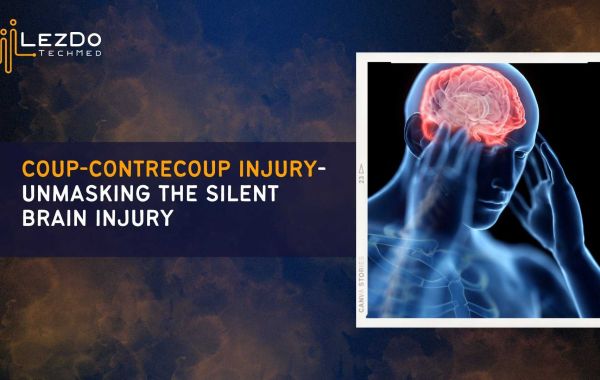https://us.lezdotechmed.com/blog/coup-contrecoup-injury/
Coup-contrecoup injury is a type of traumatic brain injury that occur when the brain slams into the inner surface of the skull due to sudden acceleration or deceleration of the head. These injuries are typically seen in situations like vehicle collisions, falls from a significant height, contact sports, and physical abuse. The brain suffers injury at the initial point of impact (coup injury) and also at the opposite side due to the rebound force (contrecoup injury).
The symptoms of coup-contrecoup injuries are diverse and depend on the severity and location of the injury. Frequent or severe headaches, dizziness, issues with concentration, memory loss, nausea, visual problems, and emotional or psychological disturbances like anxiety, depression, and mood swings are commonly reported.
Accurate diagnosis is a crucial part of managing these injuries. The evaluation typically involves a comprehensive medical history assessment, a thorough physical examination, and a range of diagnostic techniques. Neurological examinations, Computed Tomography (CT) scans, MRI scans, neuropsychological assessments, Electroencephalography (EEG), Positron Emission Tomography (PET) scans, and Functional Magnetic Resonance Imaging (fMRI) can be used to pinpoint the injury's location and evaluate its impact on the brain.
Treatment for coup-contrecoup injuries aims to stabilize the patient, prevent further damage, manage symptoms, and promote recovery. This often involves a combination of medications for pain management, inflammation reduction, and symptom relief, and various rehabilitation therapies. Physical, occupational, and speech therapies, as well as psychotherapy, can be beneficial. Adequate rest and sleep, dietary adjustments, and lifestyle modifications are recommended to promote healing and prevent symptom aggravation. In certain cases, assistive devices may be recommended, and severe injuries may require surgical intervention.
It is important to remember that coup-contrecoup injuries are serious and can have long-lasting effects. The key to successful treatment lies in early detection, accurate diagnosis, and a comprehensive, multidisciplinary approach to management. Regular follow-ups and a dedicated rehabilitation program are crucial to help patients recover and regain their quality of life.








